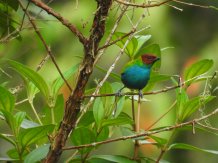Articles

A bay-headed tanager (Tangara gyrola) in La Serranía de Las Quinchas. Credit Camilo Altamar
‘Gatekeepers’ of biodiversity hotspots facing COVID crisis
Impoverished communities and diverse ecosystems in Colombia are under threat due to the COVID-19 pandemic, researchers say.
Due to historical inequalities, communities in the country’s Andean lowlands are economically poorer and more vulnerable than those in the high Andes.
The pandemic and lockdown restrictions have meant many lowland people are unable to meet their basic needs.
This situation puts highly biodiverse ecosystems at risk. People may be forced to extract precious wood species from the forest to buy food, and may also be pushed to work with coca producers and drug traffickers, often leading to environmental and social damage.
A research team working in the area – led by the University of Exeter and the University of Bristol – is raising money to help the people of La Serranía de Las Quinchas during the crisis.
“Our project aims to understand how socio-ecological systems in the Colombian Andes survive and recover following years of conflict,” said Dr Dunia H. Urrego, who is from Colombia and is now based at Exeter’s Global Systems Institute.
“Our research sites are located at different altitudes and environments in the inter-Andean valleys, and one thing is very clear: lowland communities are more impoverished and vulnerable than those in the high Andes.
“Yet, these lowland communities are essentially the gatekeepers of some of the most diverse ecosystems in the world.
“This is the case in Las Quinchas, where the pandemic has affected people’s livelihoods, with direct repercussions for deforestation and conservation.
“By contributing to this crowd-funding campaign, people can help vulnerable communities in Colombia and ultimately help protect biodiversity.”
The campaign will support the communities of Puerto Pinzón and La Cristalina, two villages of about 900 inhabitants in total living inside La Serranía de las Quinchas.
The villages are isolated, with little access to medical facilities. They have suffered greatly during the internal armed conflict due to paramilitary forces and drug traffickers in the area. This history also makes the villagers at Las Quinchas a lot more vulnerable to the COVID-19 pandemic.
Dr Monica Amador, of the School of Geographical Sciences at the University of Bristol, said: “It is clear that we need to do our best to contribute.
“We are aware of the importance of showing our support during these difficult times of Coronavirus, both for social and environmental reasons.
“The coronavirus crisis should turn our focus towards increasing environmental protection and promote harmonious socio-environmental relationships and inclusive socio-environmental governance.”
The crowd-funding campaign will provide food, face masks and antibacterial gel for the most vulnerable families in Las Quinchas. The organisers expect to help 70 families – about 350 people.
To find out more and contribute, visit: www.justgiving.com/crowdfunding/lasquinchas-relief
Dr Urrego added: “Besides economic help, I feel we can help these vulnerable communities by creating awareness and giving them a voice.”
The research project – “BioResilience of socio-ecological systems in the Colombian Andes” – is one of five UK projects supported by the Natural Environment Research Council and the Arts and Humanities Research Council under the Newton-Caldas ColombiaBIO programme.
Date: 30 June 2020
